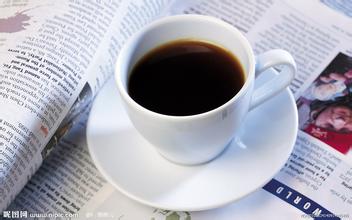Introduction to the characteristics of high-quality coffee beans with flavor and taste in the coffee variety producing area of Jinchu, Kenya
Kenyan coffee is mostly grown at an altitude of 1500m, 2100m, and is harvested twice a year. To ensure that only ripe berries are picked, people must tour the forest about seven times. Kenyan coffee is grown by small farmers. After they harvest the coffee, they first send the fresh coffee beans to the cooperative cleaning station. The washing station sends the dried coffee to the cooperative in the form of "parchment coffee beans" (that is, coffee beans covered with endocarp) to the cooperative ("parchment coffee beans" is the last state of coffee beans before peeling). All the coffee is collected together, and the growers charge the average price according to their actual quality. This trading method generally works well and is fair to both growers and consumers.
Kenyan coffee-status quo
Kenyan coffee beans the Kenyan government takes the coffee industry very seriously, where it is illegal to cut down or destroy coffee trees. Kenyan coffee buyers are world-class high-quality coffee buyers, and no other country can grow, produce and sell coffee on a continuous basis like Kenya. All coffee beans are first acquired by the Kenya Coffee Commission (CoffeeBoardofKenya, CBK), where they are identified, graded, and then sold at weekly auctions, where they are no longer graded. The Kenya Coffee Commission only acts as an agent to collect coffee samples and distribute them to buyers so that they can determine the price and quality. The auction in Nairobi is for private exporters, and the Kenya Coffee Commission pays growers a price below the market price. The best coffee grade is bean berry coffee (PB), followed by AA++, AA+, AA, AB and so on. The fine coffee is shiny, delicious and slightly alcoholic. Auctions are also organized to meet the needs of dispatchers. This kind of auction usually has a small auction volume (3-6 tons each), with samples with the grower's logo for buyers to enjoy. After the auction, the exporters pack according to different flavors, different qualities and the quantity required by the blenders. This provides a great deal of flexibility for the dispatcher. Quality-conscious Germans and Scandinavians are long-term buyers of Kenyan coffee.
On an international scale, the increase in the number of Kenyan coffee is obvious, with exports of 800000 bags in 1969-1970 and increased to 2 million bags in 1985-1986. Now the yield is stable at 1.6 million bags, with an average yield of about 650kg per hectare. Even before coffee prices skyrocketed in recent years, the average price of coffee in Kenya had been rising. Prices in 1993-1994 were 50% higher than they were 12 months ago. The rise in prices is mainly the result of increased demand.
Some buyers, especially Japanese businessmen, have expressed dissatisfaction with the Kenyan coffee industry system. Some businessmen say that the quality of coffee in the country has declined, and point out that buying directly from farmers may be a way to improve the quality. But in any case, Kenya's detailed rules and regulations and sound procedures are a model for all coffee-producing countries.
Kenyan Coffee became more famous with the sensation of the Hollywood movie OutofAfrica. Karen, the heroine played by Meryl Streep (MarylStreep), is a writer and coffee plantation owner. Many people may still remember the beautiful scenery and the magnificent sunset in the film, but what is even more unforgettable is Karen's dream of having a coffee plantation in Africa.

Important Notice :
前街咖啡 FrontStreet Coffee has moved to new addredd:
FrontStreet Coffee Address: 315,Donghua East Road,GuangZhou
Tel:020 38364473
- Prev

Introduction to the taste of high-quality coffee beans in Ecuadorian coffee producing areas
The famous South American brand, Ecuadorian Grade A coffee, has a large state-run seed value garden; 100% is produced in the natural vegetation zone of 1300-2000 meters highland, popular in Europe and the United States, and tastes exquisite world-class Arabica Arabica flavor at supermarket prices. ES Coffee is a clean organic coffee grown on the slopes of the Andes in Latin America. It is 100% pure coffee, through efforts to change
- Next

When did Jamaican coffee be exported to China? introduction to the price and flavor of Blue Mountain Coffee production area.
From the above, we can get a general picture of the production of Blue Mountain Coffee. It should be noted that 99.9% of the blue mountains that can be drunk in China are only grown near the Blue Mountains. Only coffee produced on 6000 hectares above 1600 meters above sea level can be called Blue Mountain, and the yield is always less than 900t. According to the principle of 10% supply to the world outside Japan, this kind of coffee can be called Blue Mountain.
Related
- Detailed explanation of Jadeite planting Land in Panamanian Jadeite Manor introduction to the grading system of Jadeite competitive bidding, Red bid, Green bid and Rose Summer
- Story of Coffee planting in Brenka region of Costa Rica Stonehenge Manor anaerobic heavy honey treatment of flavor mouth
- What's on the barrel of Blue Mountain Coffee beans?
- Can American coffee also pull flowers? How to use hot American style to pull out a good-looking pattern?
- Can you make a cold extract with coffee beans? What is the right proportion for cold-extracted coffee formula?
- Indonesian PWN Gold Mandrine Coffee Origin Features Flavor How to Chong? Mandolin coffee is American.
- A brief introduction to the flavor characteristics of Brazilian yellow bourbon coffee beans
- What is the effect of different water quality on the flavor of cold-extracted coffee? What kind of water is best for brewing coffee?
- Why do you think of Rose Summer whenever you mention Panamanian coffee?
- Introduction to the characteristics of authentic blue mountain coffee bean producing areas? What is the CIB Coffee Authority in Jamaica?

